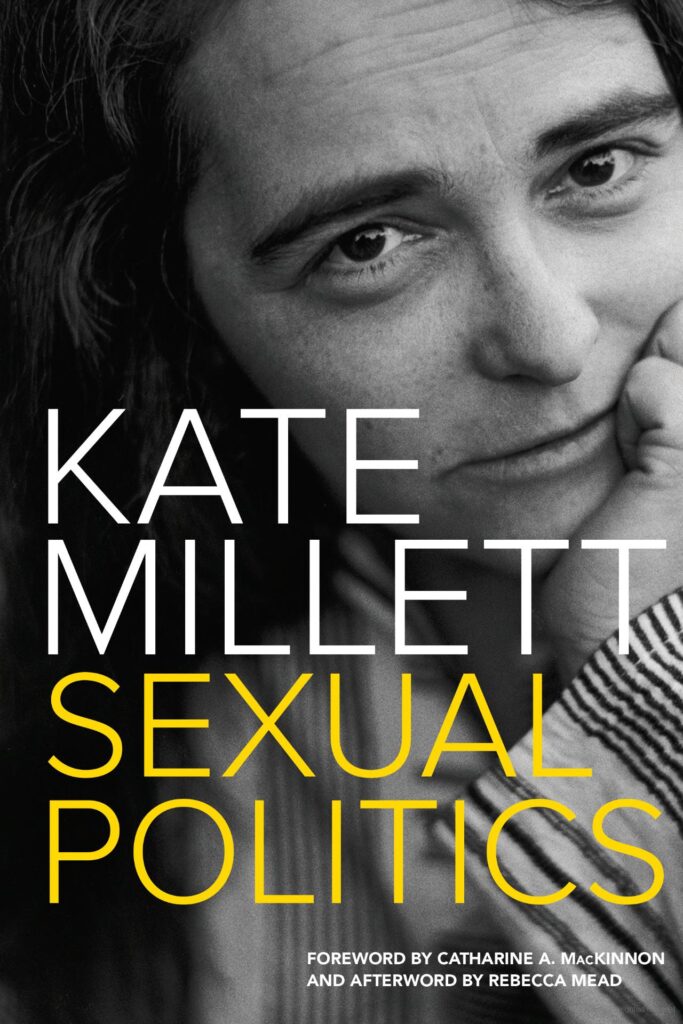QUESTION: – What is Kate Millets view on sexual politics and core-gender identity ?
ANSWER: –
Kate Millett (1934–2017), an American feminist writer, activist, and academic, is best known for her contributions to feminist literary criticism and gender studies. She was a key figure in the second-wave feminist movement and significantly influenced radical feminism. Millett studied literature at Oxford and earned her Ph.D. from Columbia University. Her work focused on deconstructing patriarchy, examining sexual politics, and critiquing the representation of women in literature and culture.
Millett’s seminal work, Sexual Politics (1970), is one of the earliest feminist critiques of patriarchy in literature and society. In this book, she argues that sex-based oppression is not merely a personal issue but a structural and institutionalized system of power. She applies a political lens to gender relations, analyzing how men use ideological, literary, and psychological tools to sustain dominance over women. She critiques the works of male authors like D. H. Lawrence, Henry Miller, and Norman Mailer for their reinforcement of patriarchal values. She explores how literature has historically shaped gender norms.
Kate Millett’s views on sexual politics center on the idea that gender is a political category rather than a natural or biological distinction. She argues that patriarchy is an institutionalized system of power relations in which men control and oppress women through social, cultural, economic, and political means. Millett applies the concept of power politics to gender relations, asserting that patriarchy functions similarly to other hierarchical systems of oppression, such as colonialism and class struggle.
Millett asserts that gender roles are not biologically determined but are instead imposed through a systematic process of socialization. From childhood, individuals are conditioned into specific behaviors, expectations, and limitations based on their assigned sex. This conditioning is reinforced through:
- Family structures: Traditional family models place men as heads of households and decision-makers, while women are relegated to domestic roles.
- Education systems: Schools and curricula reinforce gender norms by prioritizing male-centric history, literature, and sciences while neglecting women’s contributions.
- Media and culture: Literature, films, and advertisements propagate male dominance by glorifying masculinity and portraying femininity as weak or subservient.
Millett highlights how ideology justifies and perpetuates patriarchy. She argues that institutions such as religion, literature, philosophy, and psychology have historically served male interests by framing women as naturally inferior. For example:
- Religious texts often reinforce male superiority by defining women’s roles in relation to men (e.g., the concept of Eve as secondary to Adam).
- Philosophers like Aristotle and Rousseau justified women’s subjugation by claiming they lacked rationality or were suited only for domestic life.
- Psychoanalytic theories, particularly Freud’s, pathologized female sexuality (e.g., the concept of “penis envy”) and reinforced traditional gender roles.
Millett challenges these views, arguing that they are not objective truths but patriarchal constructs designed to sustain male dominance.
One of Millett’s key contributions is her feminist literary criticism, where she analyzes how literature serves as a tool of patriarchy. She critiques male authors such as:
- D. H. Lawrence for idealizing male dominance in relationships.
- Henry Miller for portraying women as sexual objects with no autonomy.
- Norman Mailer for glorifying aggression and violence against women.
Millett argues that these works shape societal perceptions of gender, reinforcing male supremacy and limiting women’s agency. She calls for a re-evaluation of literature and the inclusion of women’s voices to counterbalance centuries of patriarchal narratives.
Millett challenges the concept of core-gender identity, which suggests that individuals have an intrinsic and fixed gender identity tied to their biological sex. Instead, she argues that:
- Gender is a learned behavior, not an innate trait.
- Masculinity and femininity are artificial categories created to enforce patriarchal norms.
- The idea of a “natural” gender identity serves patriarchal interests by discouraging individuals from questioning gender roles.
This perspective laid the foundation for later queer theory and gender studies, influencing scholars like Judith Butler, who developed the concept of gender performativity.
Millett argues that patriarchy controls women not only through social institutions but also through sexuality itself. She critiques how female sexuality is:
- Repressed and controlled through laws, religious doctrines, and social expectations.
- Defined in relation to men, where women’s sexual experiences are often shaped by male desire rather than their own autonomy.
- Weaponized against them, as seen in historical and legal practices such as marital rape laws, virginity tests, and honor-based violence.
Millett believes that true gender liberation requires sexual liberation, where women have the right to control their own bodies, desires, and reproductive choices.
Another crucial aspect of Millett’s analysis is how economic structures contribute to female oppression. She argues that patriarchy is sustained by keeping women economically dependent on men. Key economic factors include:
- Wage inequality: Women are paid less for the same work, reinforcing financial dependence.
- Unpaid domestic labor: Women’s household and caregiving work is undervalued and invisible in economic systems.
- Limited job opportunities: Many industries have historically excluded women from leadership and high-paying positions.
Millett calls for economic reforms such as equal pay, workplace rights, and the redistribution of domestic labor to achieve true gender equality.
Millett asserts that gender oppression can only be dismantled through feminist consciousness and political activism. She urges women to:
- Reject traditional gender roles and redefine their identities outside patriarchal norms.
- Challenge male dominance in politics, media, and culture.
- Engage in feminist movements to fight for equal rights and systemic change.
She envisions a radical restructuring of society, where power is no longer based on gender but on equality and shared responsibility.
Kate Millett’s Sexual Politics remains a foundational feminist text that deconstructs the mechanisms of patriarchy and argues for the social construction of gender, sexual liberation, economic equality, and feminist activism. Her insights continue to shape modern discussions on gender identity, systemic patriarchy, and intersectional feminism.
Millett’s critique of sexual politics is still highly relevant today, particularly in debates surrounding gender identity, LGBTQ+ rights, and systemic patriarchy. Her argument that gender roles are socially constructed aligns with modern feminist and queer theories, which advocate for the recognition of gender as fluid rather than biologically determined.
However, one limitation of Millett’s analysis is that it primarily focuses on Western literary and cultural traditions, overlooking the intersectionality of gender with race, class, and colonialism. While her critique of patriarchy is powerful, a more inclusive approach that considers non-Western gender perspectives would strengthen her arguments.
Nevertheless, Millett’s insights laid the foundation for feminist literary criticism and gender studies, influencing later theorists such as Judith Butler and bell hooks. Her call for dismantling patriarchal structures remains significant in contemporary discussions about gender equality, feminism, and human rights.



